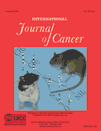Immunosurveillance is active in colorectal cancer as downregulation but not complete loss of MHC class I expression correlates with a poor prognosis
Abstract
Many colorectal tumors lose or downregulate cell surface expression of MHC class I molecules conferring resistance to T-cell-mediated attack. It has been suggested that this phenomenon is due to in vivo immune-tumor interactions. However, evidence of the impact of MHC class I loss on outcomes from colorectal cancer is scarce. In our study of more than 450 colorectal cancers in tissue microarray format, we have shown that both high levels of MHC class I expression and absent MHC class I expression are associated with similar disease-specific survival times, possibly due to natural killer cell-mediated clearance of MHC class I-negative tumor cells. However, tumors with low level expression of MHC class I were found to confer a significantly poorer prognosis, retaining independent significance on multivariate analysis. The existence of these poor prognosis tumors, which may avoid both NK- and T-cell-mediated immune surveillance, has important implications for the design of immunotherapeutic strategies in colorectal cancer. © 2005 Wiley-Liss, Inc.




